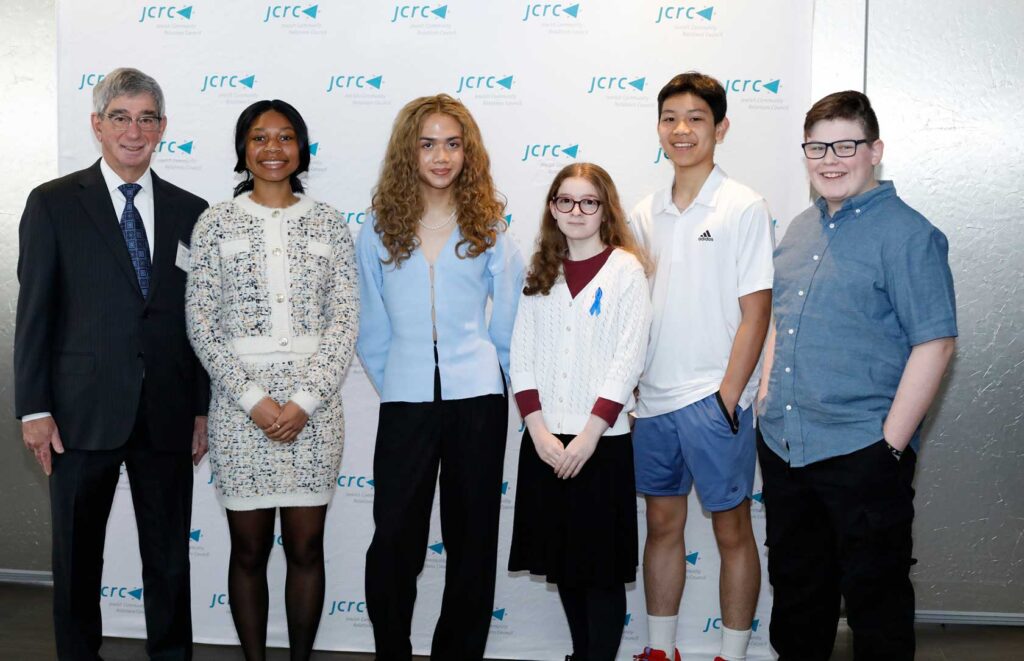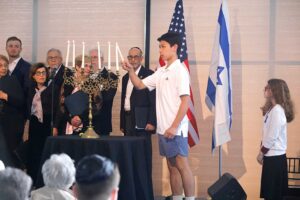
An annual Massachusetts essay contest to commemorate the Holocaust produced winning entries that drew on local students’ experiences with alienation and bias in a society still grappling with racism and antisemitism while also noting the importance of preserving family stories of struggle.
The competition, sponsored by the family of the late Holocaust survivor Israel Arbeiter and the Jewish Community Relations Council of Boston, featured entries from a number of students of color. The 400–800-word essays were submitted by middle and high school students.
The six winners of the 18th Annual Israel Arbeiter Holocaust Essay Contest honored at the State Room in Boston included Sean Gabriel Biteranta, an 11th grader at Stoughton High School, Rex Chen, an 8th grader at Hingham Middle School and Heaven Rowell, a 12th grader at Stoughton High School, who each received framed certificates from Arbeiter’s son, Jack.
Also receiving certificates were Chris Bingham, an 8th grader at the Horace Mann Middle School in Franklin, Eliana Goldenholz, a 10th grader at the Maimonides School in Brookline, and Nathan Pichardo, an 8th grader at Tenney Grammar School in Methuen. They will all be going on a November trip to the U.S. Holocaust Memorial Museum in Washington.
Biteranta, who was born in the Philippines and lived in California before moving to Stoughton with her family, wrote about survival and the importance of re-telling your stories.
“Human life is a centuries-long story of survival, and if we’re lucky enough, someone will listen to our stories and preserve them,” she wrote. “In doing so, we preserve our ability as human beings to feel for one another.”

Rex Chen and Eliana Goldenholz (first-place winners) lighting the candle for All the Children. PHOTO: COURTESY JCRC BOSTON/ JOHN RICH PHOTOGRAPHY
In his essay, Chen wrote, “These testimonies are vital to preserving historical truths, promoting sympathy, and inspiring action toward injustice in society today.”
“They remind us of the effects of hatred, discrimination, and prejudice. They force us to confront the truths about humanity’s evil power and find solutions.”
Pichardo’s essay emphasized the validity of the testimonies. “Survivor stories aren’t just like books we can read for fun,” he wrote. “They’re real-life tales that teach us important lessons.”
Each student had learned about the Holocaust prior to the contest and felt an affinity with the victims of almost a century ago.
“I was taught a lot of valuable lessons about life and love,” Biteranta told the Banner, recalling early life in the Philippines.
“I’m a minority myself, being an immigrant Filipino, so I’ve definitely experienced discrimination,” Biteranta continued. “I don’t necessarily have similar experiences to those of the victims of the Holocaust, but from years of self-improvement, I was able to teach myself empathy. So while I may not exactly be able to relate, I was able to put myself in their shoes and feel what they felt.”
Chen’s mother, a teacher, and his father, who works in a restaurant, came to the U.S. during the early 2000s. In 2019, his family moved from Quincy to Hingham.
“My parents were Chinese immigrants who had to overcome physical and mental obstacles,” Chen told the Banner. “And now, they carry their own stories of hope and survival.”
Like the others, Chen didn’t just learn about the Holocaust – he applied it in context to his own life. “Compared to the struggles Jews faced during the Holocaust, I have it much easier,” he acknowledged. “Everything seems given to me. I have good food, nice clothes, and a stable roof over my head.”
But he knows that not everyone is that fortunate, and like Jews in late 1930s Europe, it can all disappear in a moment.
“I realize many of the things I regularly take for granted never seem important until they are taken away,” Chen said. “And so I learned about the different paths Holocaust survivors took to save themselves and the people they loved. I learned the importance of getting up and trying again, even after being beat down and stepped on time after time. I also learned the importance of forgiveness.”
And of bravery. “Nothing will change if you don’t do anything to change it,” he added. “No one will care unless you advocate. And no one will remember unless you teach.”
“I was overwhelmed with sympathy and admiration for the reality and strength of the survivors and Jewish community,” Rowell told the Banner. “Not just out of a place of empathy, but from a place of understanding, of being an African American and sharing a similar history.”
“Growing up, I felt out of place in society and experienced the claws of racism at a very early age,” Rowell explained. “I noticed many things, like how my family was the only Black family on our street, how people would look as I walked around a store with my mom, or how I got in trouble when a little white girl called me the ‘N-word’ in 5th grade.”
“Most of these Holocaust stories did not come out in one stroke, and in Anne Frank’s and Oskar Schindler’s cases, not even by themselves,” Biteranta wrote in her essay, “but rather by those around them who listened and preserved their stories for the world to recognize.”
All look forward to the trip to Washington. Biteranta, who has never been there, is excited to experience it, as is Chen. “I hope to learn more about World War II and the Holocaust in detail,” he said. “I also want to gain a deeper understanding of how my country operates, and of American culture. And finally, I want to take in the vibrance of the city and its food, monuments, and art.”
Arbeiter, a Holocaust survivor who settled in Newton and who died in 2021 at age 96, was born in Plock, Poland, and was 14 when World War II erupted. His parents and younger brother died at Treblinka, and he and his two remaining brothers worked in slave labor at other Nazi concentration camps that included Auschwitz-Birkenau.
After the war, he founded the American Association of Jewish Holocaust Survivors of Greater Boston, co-founded the New England Holocaust Memorial, and worked tirelessly to promote awareness about the Holocaust and to preserve the memories of its victims.
His work continues to inspire students like this year’s winners.
“Israel Arbeiter worked hard to make sure we don’t forget about the Holocaust and how it changed the world,” Pichardo wrote in his essay. “He wants us to understand what happened, so we can learn from it.”
Chen’s essay imagines a better world based on Arbeiter’s teachings. “By creating a society centered around tolerance, compassion and dignity, people can continue to honor the victims of the Holocaust and strive for a greater future,” he wrote. “As Israel Arbeiter said, ‘There is never enough remembering.’”






